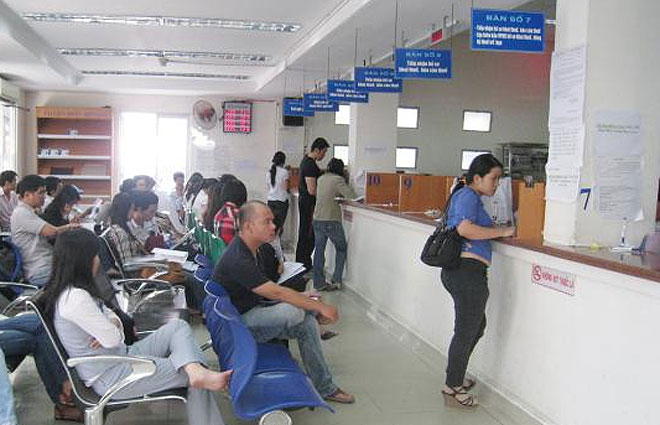Seven ministries and agencies join fight against transfer pricing
 |
| People paying tax at the Ho Chi Minh City Department of Taxation (illustration photo) |
| RELATED CONTENTS: | |
| New decree to thwart BEPS practices | |
| New transfer pricing decree: a step closer to international standards | |
| Tax reform and transfer pricing | |
According to the figures of the General Department of Taxation on the inspection and assessment of 130 enterprises regarding transfer pricing in the period of 2010-2015, total losses were reduced by VND2.962 trillion ($130.3 million), taxable incomes increased by VND3.430 trillion ($150.9 million), and the tax arrears, refunds, and penalties were VND724 billion ($31.86 million). Why do these figures not match with those annually released by tax agencies?
In 2016, tax agencies inspected 329 enterprises that conducted controlled transactions. After all the inspections, the total tax arrears, refunds, and penalties were VND607.52 billion ($26.73 million), losses were reduced by VND5.162 trillion ($227.1 million), deductible taxes decreased by VND2.04 billion ($89,760), and taxable incomes were adjusted upwards by over VND2.121 trillion ($93.3 million).
Previously, in 2015, the total tax arrears, refunds and penalties were over VDN1.062 trillion ($46.7 million), deductible taxes decreased by nearly VND303 billion ($13.3 million), and losses decreased by over VND10.050 trillion ($442.2 million).
These inspections were for enterprises that conducted controlled transactions, transactions among associated enterprises at any stage of operation, during manufacturing, trading, securing production machinery, or providing any kind of services—the deals were present across the whole spectrum of doing business. However, controlled transactions do not necessarily include transfer pricing.
These figures show that the losses from tax arrears, refunds, and penalties, as well as deductible taxes in 2015 were much lower than in 2016. Why was this so?
After the Ministry of Finance (MoF) issued Circular No. 66/2010/TT-BTC on guiding the determination of market prices in business transactions between associated parties, tax agencies focused on inspecting controlled transactions to press enterprises to obey the tax laws better. Many enterprises have yet to be inspected by tax agencies, but they actively adjusted their manufacturing and business results, recalculated taxes, and paid full tax to the national budget.
Increasing inspections is a way to fight against transfer pricing. However, in accordance with Directive No.20/CT-TTg on reforming the inspection practices of government agencies that the prime minister signed less than a month ago, state agencies are not allowed to inspect enterprises more than once a year. How will this affect the activities of the General Department of Taxation?
Inspection not only raises the national budget, it also creates a transparent and fair business environment for enterprises. However, state agencies should facilitate enterprises’ manufacturing and business operations, as well as their investment expansion. In particular, state agencies should avoid causing trouble and annoying enterprises.
As stipulated in the directive, tax agencies should only inspect enterprises with actual signs of tax fraud, or those in fields with a high possibility of tax fraud, and especially previous violators.
Every year, enterprises must file their tax, which the tax agencies will duly check. If we find tax fraud, they will be on the list of on-site inspections. This process closely follows the procedures on inspection and Directive 20.
Also, the cooperation with MoF, the Ministry of Planning and Investment (MPI), the State Bank of Vietnam (SBV), the Ministry of Science and Technology (MoST), the Ministry of Agriculture and Rural Development (MARD), the Ministry of Information and Communication (MIC), the Ministry of Industry and Trade (MoIT), and municipal and provincial people’s committees will increase the efficiency of this whole process and further discourage transfer pricing.
Enterprises are now more ready to voluntarily obey the tax laws, is it necessary to cooperate with seven ministries and municipal and provincial people’s committees?
Transfer pricing is a global matter, as the more deeply Vietnam is integrated into the world economy, the more frequent and complicated transfer pricing becomes. Thus, MoF and tax agencies need support from other ministries and municipal and provincial People’s Committees.
In particular, SBV will be responsible for the supply of information and figures on foreign borrowings and loans of enterprises that conduct controlled transactions.
MPI has to provide figures on business registration and the structure of investment capital (as recorded in the business registration), and track any adjustments to investment and business registration certificates and other relevant information of projects that show signs of tax fraud or tax evasion.
MoST and MARD has to provide information on technology transfer contracts, industry ownership transfer contracts, plant breed transfer contracts, and registration documents of intellectual property rights, so that tax agencies can perform their tasks.
What about MIC?
Part of the success of the fight against transfer pricing is thanks to public communication. Thus, Decree No.20/2017/ND-CP required MoF to cooperate with MIC to raise public awareness of state administration on controlled transactions. Besides, MIC also has to provide information on firms under its management and keep tabs on controlled transactions in the digital economy as proposed by MoF.
What the stars mean:
★ Poor ★ ★ Promising ★★★ Good ★★★★ Very good ★★★★★ Exceptional
Latest News
More News
- Vietnam’s pivotal year for advancing sustainability (February 19, 2026 | 08:44)
- Strengthening the core role of industry and trade (February 19, 2026 | 08:35)
- Future orientations for healthcare improvements (February 19, 2026 | 08:29)
- A cultural development pillar for the new period (February 19, 2026 | 08:22)
- Infrastructure orientations suitable for a new chapter (February 19, 2026 | 08:15)
- Innovation breakthroughs that can elevate the nation (February 19, 2026 | 08:08)
- AI leading to shift in banking roles (February 18, 2026 | 19:54)
- IFC to grant $150 million loan package for VPBank (February 13, 2026 | 09:00)
- SABECO celebrates diverse Tet Traditions (February 11, 2026 | 08:00)
- Canada backs Vietnam’s green transition with AGILE project (February 09, 2026 | 17:41)















 Mobile Version
Mobile Version